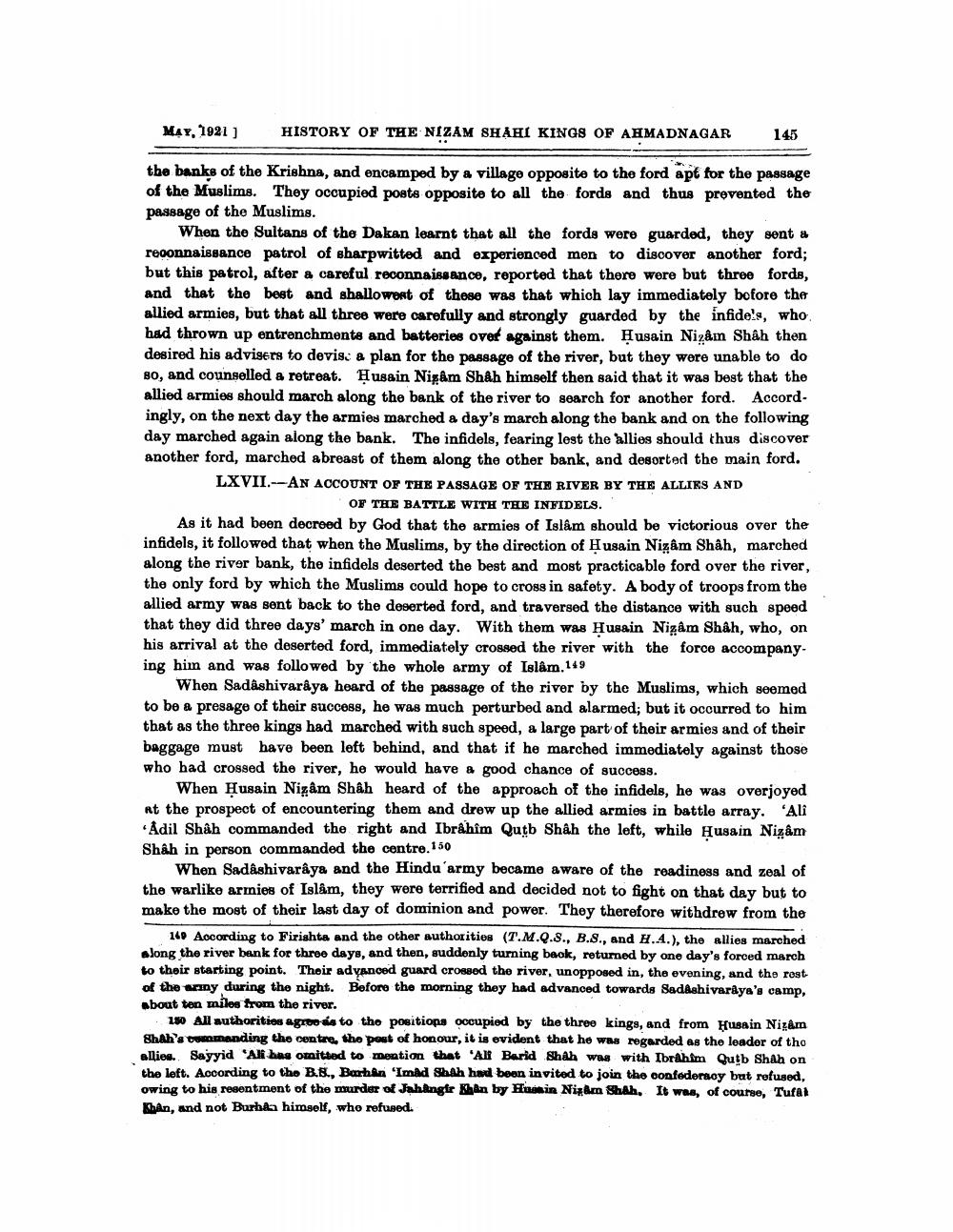________________
MAY, 1921]
HISTORY OF THE NIZAM SHAHI KINGS OF AHMADNAGAR
145
the banks of the Krishna, and encamped by a village opposite to the ford apt for the passage of the Muslims. They occupied posts opposite to all the fords and thus prevented the passage of the Muslims.
When the Sultans of the Dakan learnt that all the fords were guarded, they sent reconnaissance patrol of sharpwitted and experienced men to discover another ford; but this patrol, after a careful reconnaissance, reported that there were but three fords, and that the best and shallowont of these was that which lay immediately bofore the allied armies, but that all three were carefully and strongly guarded by the infidels, who had thrown up entrenchments and batteries over against them. Husain Nizâmn Shâh then desired his advisers to devis: a plan for the passage of the river, but they were unable to do 80, and counselled a retreat. Husain Nigam Shah himself then said that it was best that the allied armies should march along the bank of the river to search for another ford. Accordingly, on the next day the armies marched a day's march along the bank and on the following day marched again along the bank. The infidels, fearing lost the allies should thus discover another ford, marchod abreast of them along the other bank, and desorted the main ford. LXVII.--AN ACCOUNT OF THE PASSAGE OF THE RIVER BY THE ALLIRS AND
OF THE BATTLE WITH THE INFIDELS. As it had been decreed by God that the armies of Islam should be victorious over the infidels, it followed that when the Muslims, by the direction of Husain Nizam Shah, marched along the river bank, the infidels deserted the best and most practicable ford over the river, the only ford by which the Muslims could hope to cross in safety. A body of troops from the allied army was sent back to the deserted ford, and traversed the distance with such speed that they did three days' march in one day. With them was Husain Nigam Shah, who, on his arrival at the deserted ford, immediately crossed the river with the force accompany. ing him and was followed by the whole army of Islam.149
When Sadashivaraya heard of the passage of the river by the Muslims, which seemed to be a presage of their success, he was much perturbed and alarmed; but it occurred to him that as the three kings had marched with such speed, a large part of their armies and of their baggage must have been left behind, and that if he marched immediately against those who had crossed the river, he would have a good chance of success.
When usain Nizam Shâh heard of the approach of the infidels, he was overjoyed At the prospect of encountering them and drew up the allied armies in battle array. Ali Adil Shâh commanded the right and Ibråhim Qutb Shâh the left, while Husain Nizâm Shah in person commanded the centre. 150
When Sadashivarâya and the Hindu army became aware of the readiness and zeal of the warlike armies of Islam, they were terrified and decided not to fight on that day but to make the most of their last day of dominion and power. They therefore withdrew from the
140 According to Firishta and the other authorities (T.M.Q.., B.S., and 1.4.), the allies marched along the river bank for three days, and then, suddenly turning baok, returned by one day's forced march to their starting point. Thoir adyanoed guard crossed the river, unopposed in, the evening, and the rest of the army during the night. Before the morning they had advanced towards Sadashivariya's camp, about ten miles from the river.
180 All authorities agrooss to the positiopa occupied by the three kings, and from Husain Nizam Shah's commanding the centre, the post of honour, it is evident that he was regarded as the leader of tho allies. Sayyid Al hus omitted to mention that 'AR Barid Shah was with Ibrahim Qutb Shah on the left. According to the B.8., Burhan 'Imad Shah had been invited to join the confederaoy but refused. owing to his recentment of the murder of Johangtr Khan by Husin Nike ShAh, It was, of course, Tufal Khân, and not Burhka himself, who refused.




